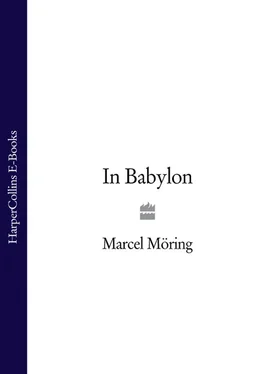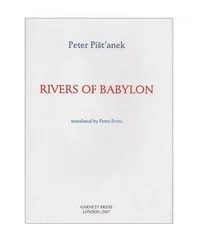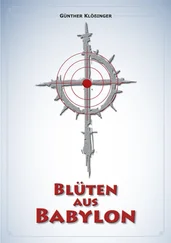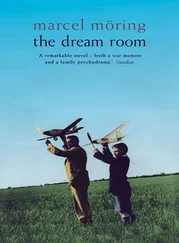By morning, Magnus had walked around the town three times and knew it as well as the village where he himself had grown up. The streets, the houses, the market square, the shooting grounds, they were all like the movement of a trusty clock. He bought bread at the baker’s and ate it on the bank of a ditch strewn with buttercups. The dew left the fields, birds flew up to the clear blue sky like tinkling bells. The smell of cow dung rose up from the ground and tickled his nostrils. A milkmaid came by with two wooden buckets on her yoke and saw him chewing his butterless bread. She put down her buckets, drew a dipper out of the milk, and gave him a drink. He thanked her in a mixture of languages he had learned along the way and she laughed like a man as she walked on. He gazed after her, the broad hips in the long striped skirt, the plump back, the full, rounded arms. A land of milk and butter. The milk he had drunk was nearly yellow with cream. He was no farmer, but even a layman could see how succulent and tender the grass was here.
Halfway through the morning he tugged on the copper bell at the merchant’s house and was let in by the servant girl. She gave him milk in a mug and set a plate beside it with a buttered brown slab. The milk was sweet and hot, the slab of brown was called koek and tasted of anise. After he’d eaten he was shown into the parlour – but no one was there. The table had been cleared and laid with a coarse linen cloth. He went and fetched, under the maid’s supervision, the clocks he had seen earlier, and set about his work. Although the clocks were a different shape from those he knew, he was familiar with the works, and by noon he had cleaned and oiled two of the four. Then the maid came for him and in the kitchen, where a portly cook was stirring a pot, he was given bread and cheese. It wasn’t until he had closed up the last clock that the lady of the house walked in. The maid followed her carrying a tray with a teapot, a blue and white plate of butter biscuits, and a little tower of porcelain. Magnus cleared off the table, cleaned his instruments, and packed up his chest. All that time the young woman watched him gravely. Then she removed the cloth from the table, set it, and had him sit down again.
‘ Nu ,’ she said. ‘ Lomir redn .’
So. Let’s talk.
The maid left the room. Magnus, his mouth a carriage house, stared at the woman in amazement.
They spoke. They spoke like the tea that flowed, fragrant, from the spout of the teapot, like the biscuits that crumbled between their teeth and left a buttery film on their fingertips. They spoke until the windowpanes turned grey, blue, and finally indigo. They spoke, and it was, as Magnus would later say, as if he were emptying and filling at the same time.
Then the merchant came in.
‘A beard,’ said Magnus, many centuries later, ‘a beard like a cluster of bees. A head of hair – he was my future father-in-law but there’s no other way to describe it, I’m sorry – a head of hair like a witch’s broom. My heart didn’t just stop: it was no longer there.’
‘Becky,’ the giant had said. (‘A giant, Nathan,’ said Magnus. ‘I didn’t even know that Jews could be so big. A voice like the great clock in Worky.’) ‘Becky, I didn’t know we had guests.’
‘ Tatele ,’ she said. ‘This is the clockmaker.’
And Magnus had jumped up, knocking over his chair, clicked his heels (as he had learned in Germany), bowed from the hips, and cried, ‘At your service, Your Grace, Magnus Levi!’ And he thought, Tatele? Little Papa?
Becky and her father had laughed like the rain: he, a gusty cloudburst of deep, sonorous tones, she, a spring shower on a velvety meadow.
A clockmaker, even though he travelled about and carried all his wordly possessions in a chest upon his back, was good enough for Rebekka Gans. Her father, Meijer, a dealer in livestock, had also started from scratch. He knew that the Jews in neighbouring countries, and even in some parts of the Lowlands, lived by the grace of the good-naturedness of their local administrators. He had been in the North, where no more than three Jewish families were allowed to live in town, where Jews were only allowed to be butchers, tanners, or peddlers, and were forbidden to build synagogues. The tolerance in this region, and especially in the prosperous West, had made him a wealthy man, but he had never forgotten his own humble beginnings.
That was why, even though Magnus was poor and had no home, Meijer Gans looked at the character of the man who wanted his daughter and not at his position or means. He peered into Magnus’s soul, seeking ambition and a spirit of enterprise. He was pleased with what he found.
The couple were given Salomon Coster’s clock and a dowry in silver when, two months later, they left for West Holland. In Rotterdam, a cousin of Meijer Gans’s who dealt in grain helped them find a house. The widower himself – Rebekka’s mother had died of childbed fever shortly after her birth – remained behind in the East. He would miss his daughter the way a man misses an arm, yet he wished her happiness and good fortune, things that, in his opinion, were best found in the West. Magnus embarked on a new life and, as if to show how much he wanted to be and belong here, he changed his name to Hollander. He knew of no better way to stress his wholehearted devotion to this rich land of luscious grass, creamy milk, and golden yellow cheese.
A son was born, one, whom they named Chaim. He became a clockmaker and met a girl called Zipporah Leib. The son married the Leib girl. They had a son, who was named after Grandfather Meijer and, scarcely three years after his birth, died of galloping consumption. Chaim thought he had provoked the Lord of the Universe by not giving his firstborn son the name he should have had, and so, seven years later, when another son was born, he was called Heijman, the Dutch version of Chaim, which means ‘life.’ The boy was strong and healthy and, like his father, became a clockmaker. He married, as had every other man in the family, late. He took Chava Groen as his wife, and when they were nearly forty she had a son whom they called Heijman. He married Lenah Arends, and from their alliance, too, came one son: Heijman Three. He took Rebecca van Amerongen as his wife, who bore him Heijman Four. The nineteenth century was two years old by then. Heijman Four and his wife, Esther de Jong, had a child at the age of forty-three. It was a son: Heijman Five. This descendant of the house of Hollander, a clockmaker, married young. He was twenty-three when he met Anna Blum and twenty-four, Anna twenty-five, when they knew the joy of offspring: Heijman Six.
The tide of time (Magnus’s words) had driven the Hollanders to the West, to Rotterdam, that boisterously expanding merchant city on the North Sea coast, and there it seemed as if they had finally landed in a peaceful haven. Seven generations of Heijmans (if we count the first, who was called Chaim) grew up there. Magnus and Rebekka lived to see their children’s children, but could sense that the younger generation were ashamed of the family’s humble origins; embarrassed by Magnus’s old work-coat, the wooden chest Rebekka had hung on the wall and the modest trade in matzos, dried fruit and nuts that she and her friend Schoontje ran from a little shop in the Jewish quarter.
‘That’s the way it goes,’ said Magnus, in keeping with the analysis that my grandfather, the last Heijman Hollander, liked to make of The Journey to the West. ‘You start with a stone, a piece of rope and a threadbare coat, and you build a house so your children will have a roof over their heads, a safe place to live, but once they’ve grown, they say: Come, Father, throw away that stone and that rope and that old coat. Everyone wants a house, no one likes to be reminded of all the grief that came before it.’
Читать дальше












